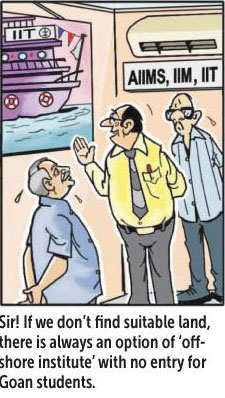LEVIS GOMES
To many Goans, it came as a bolt from the blue. Revocation of Indian Passport has left all of us in deep anguish, shock and of uncertain future. The resolution, at best, is intricate and complex.
The Honorable Member of Lok Sabha Cosme Francisco Caitano Sardinha, raised the pertinent question “whether the Ministry has a data on number of Goans who had their passports revoked due to possession of Bilhete de Identidade of Portugal, which they have changed to Cartao de Cidadao”. In his reply on December 15, 2023, The Minister of State in the Ministry of External Affairs, V Muraleedharan stated “that the Regional Passport Office in Panaji received more than 2000 applications during the last 3 years for surrender of Indian passports consequent upon acquisition of Portuguese nationality.
In the last 3 years, 114 passports have been revoked by the RPO. The Minister of State further stated that there is well defined law in place in terms of the Passports Act 1967 and the Citizenship Act 1955 to regulate such cases.”
Earlier, as it was in many cases, at the time of surrendering Indian Passport, the passport authorities did impose penalty or fine depending on specific circumstances as outlined in the Act. After payment of the fine imposed, the Indian Passport was cancelled and a Surrender Certificate was issued. Surrender Certificate is a pre-requisite to apply for and obtain Overseas Citizen of India card. OCI affords many benefits including life-long visa and other specific benefits notified by the Ministry of External Affairs from time to time.
In November of 2022, the Ministry of External Affairs issued a Memorandum to all Regional Passport Offices including Goa to enforce Passport Act of 1967. Under the Act, passport authorities have delegated powers to impound and revoke a passport under Section 10(3b) if the passport or travel document was obtained by the suppression of material information. For the past one year or so, payment of fine was no longer an option. To their utmost shock and absolute dismay, many Goans had their passport revoked for suppression of material information.
It is of no succor to hundreds of Goans who find themselves in this predicament as a result of a High Court of Kerala ruling in June of 2020. In a writ petition filed by Citizens Legal Right Association, question was raised by the Association whether an authority under the Passport Act 1967, has any power to impose fine. The penalty list is prescribed in Schedule III of Passport Rules and in Office memorandums issued from time to time. The Ministry unsuccessfully argued that Passport Authorities would have to handle thousands of cases and prosecution in a court of would essentially bog down in a time-consuming process. As such, Passport authority were given power to impose fine instead.
The High Court of Kerala ruled that Passport Authorities have no power to impose penalties or fine for violation of Passport Act, but to prosecute in a competent court of law, as the Court observed that fines can be imposed by only a competent Magistrate.
If we read section 10 (3) of the Passport Act, we find Passport Authorities may impound or cause to be impounded or revoke a passport or travel document, (b} if the passport or travel document was obtained by suppression of material information.
The High Court of Kerala ruling had unintended consequences and many Goans who applied/renewed passports by suppressing material information after the limitation period have had their passports revoked.
The Constitution of India under Article 9 states that no person shall be a citizen of India by virtue of Article 5, or be deemed to be a citizen of India by virtue of Article 6 or article 8, if he has voluntarily acquired the citizenship of any foreign State.
We have been justifying our case for multiple nationality in the mistaken belief that Puducherry is already enjoying such status. On 21st October 1954, the Government of India and the Government of France entered into a defacto agreement wherein the control of Union Territory of Puducherry was taken by Government of India. Few years later, in 1956 a Treaty establishing De Jure Cession of French Establishment in India was signed between India and France. Article 4 of the same Treaty of Cession states that all French Nationals born in the Territory of Establishment and domiciled herein at the date when Treaty of Cession came into force shall be citizens of India. Only those French nationals who by providing a written declaration drawn up within six months of the Treaty of Cession could chose retain their French nationality.
Many of the inhabitants who opted for French citizenship could own property or continue their avocations. Those individuals with French citizenship were known as “Opthons”. There was also a provision in the agreement that persons born in Puducherry but residing in a country other than the Territory of Indian Union would also retain French nationality.
Herein lies our great challenge for dual nationality. Given that India does not recognize dual nationality, we cannot argue to bestow dual nationality only on Goans. Every Indian is equal before the law as enshrined in Article 14 of the Constitution. In the interim, we will have to await outcome of legal challenges pending before our courts under various other Acts.
Many learned scholars have made compelling arguments that India should consider dual nationality for its citizens, and join a list of more than seventy five percent of world countries that give its citizens dual nationality in some form or other. A concerted effort on national and global level by advancing the benefits of dual citizenship may it not be on a distant horizon.
